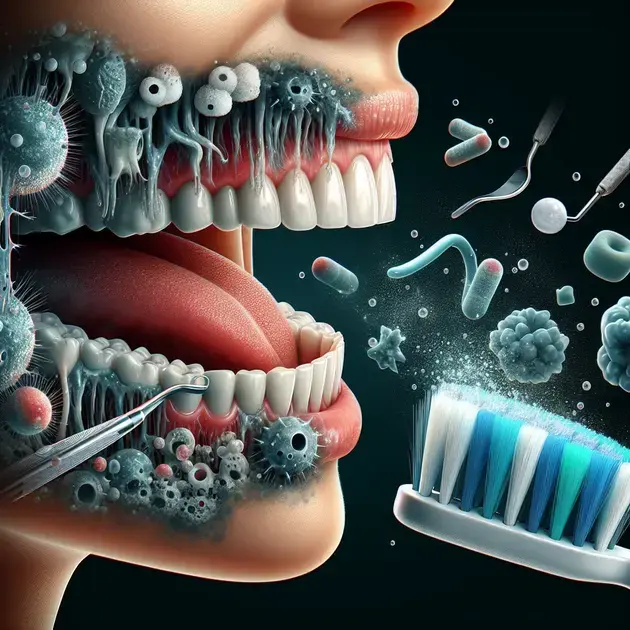Understanding the Reason of Bad Breath: A Comprehensive Guide will provide you with valuable insights into the causes and remedies for this common condition. Bad breath, also known as halitosis, can be embarrassing and affect one’s self-esteem. By understanding the root causes, you can effectively address and prevent unpleasant breath odors.
Recent studies have shown a strong link between bad breath and poor oral hygiene. Bacteria in the mouth can release foul-smelling gases, resulting in halitosis. This comprehensive guide will explore various factors that contribute to bad breath, including dietary habits, dental issues, and lifestyle choices. By gaining a deeper understanding of these reasons, you can take proactive steps to maintain fresh breath and improve your overall oral health.
Common Causes of Bad Breath Explained
Bad breath, also known as halitosis, can be caused by various factors. One common cause is poor oral hygiene, where bacteria build up in the mouth due to inadequate brushing and flossing. Other causes include certain foods like garlic and onions, smoking, dry mouth, and medical conditions such as sinus infections or diabetes.
To tackle bad breath caused by poor oral hygiene, it is essential to establish a thorough dental care routine. Brush your teeth at least twice a day and floss daily to remove food particles and plaque. Mouthwash can also help kill bacteria and freshen breath. Websites like the American Dental Association (ADA) provide detailed guides on proper oral hygiene practices.
Another common cause of bad breath is dry mouth, which can be a result of medication side effects or simply not drinking enough water. To combat dry mouth, consider using a hydrating mouth spray or chewing sugar-free gum to stimulate saliva production. Apps like WaterMinder can help track your daily water intake and remind you to stay hydrated.
Additionally, addressing underlying medical conditions and avoiding foods known to cause bad breath can also help alleviate the issue. Seeking advice from a healthcare professional or nutritionist can provide tailored solutions for managing bad breath.
By understanding the common causes of bad breath and implementing preventive measures, you can maintain fresh breath and overall oral health.
The Impact of Poor Oral Hygiene on Halitosis
Poor oral hygiene directly contributes to the occurrence of halitosis, or persistent bad breath. When dental plaque and food debris are not adequately removed from the mouth through brushing and flossing, bacteria begin to break down these substances, leading to the release of foul-smelling gases.
Over time, untreated plaque can harden into tartar, further exacerbating the problem and potentially causing gum disease. The bacteria associated with gum disease can produce volatile sulfur compounds, intensifying the unpleasant odor of bad breath.
To address the impact of poor oral hygiene on halitosis, establishing a comprehensive oral care routine is crucial. Utilize resources like the Oral Health Foundation website to learn about proper brushing techniques and the importance of regular dental check-ups.
Incorporating tools such as tongue scrapers to remove bacteria from the surface of the tongue and interdental brushes for cleaning between teeth can enhance oral hygiene efforts. Consider downloading the Brush DJ app, which offers music playlists as timers to encourage thorough brushing sessions.
Regular professional cleanings by a dentist or dental hygienist can help remove stubborn plaque and tartar buildup, improving both oral health and breath freshness. By prioritizing oral hygiene practices and seeking professional guidance, the impact of poor oral hygiene on halitosis can be effectively managed.
Effective Strategies for Preventing Unpleasant Breath Odors
Maintaining fresh breath involves not only addressing the immediate causes but also implementing effective strategies for long-term prevention. One key strategy is to stay hydrated throughout the day by drinking an adequate amount of water. Hydration helps promote saliva production, which naturally cleanses the mouth and reduces odor-causing bacteria.
In addition to water intake, incorporating crisp fruits and vegetables like apples and carrots into your diet can help clean teeth and freshen breath. These foods act as natural scrubbers and stimulate saliva flow, aiding in the removal of debris and bacteria.
Regular visits to the dentist for professional cleanings and check-ups are essential for preventing unpleasant breath odors. Dental professionals can detect early signs of oral health issues and provide personalized recommendations for maintaining fresh breath.
For a convenient and effective solution, consider using oral probiotics to balance the oral microbiome and reduce the levels of odor-causing microbes. Websites like Healthline offer insights into the benefits of oral probiotics and their role in promoting oral health.
Finally, practicing mindfulness when consuming odorous foods and beverages, such as coffee or garlic, can help mitigate their impact on breath odor. Understanding how certain substances affect breath can guide you in making conscious choices to support long-lasting breath freshness.
**Identifying the Root Causes of Halitosis**
Common Causes of Halitosis
Halitosis, commonly known as bad breath, can be caused by various factors, including poor oral hygiene, certain foods, smoking, and medical conditions. Bacteria in the mouth can produce foul-smelling compounds when they break down leftover food particles. Additionally, dry mouth can contribute to bad breath as saliva helps clean the mouth and remove bacteria.
Other common causes of halitosis include gum disease, cavities, and oral infections. These conditions can create an environment where bacteria thrive, leading to an unpleasant odor. Furthermore, lifestyle choices such as smoking or consuming strong-smelling foods like garlic and onions can temporarily cause bad breath.
Systemic diseases such as diabetes, respiratory infections, and liver or kidney issues can also manifest as halitosis. It’s essential to address any underlying medical conditions that may be contributing to bad breath to effectively combat the problem.
By identifying the root causes of halitosis, individuals can take targeted steps to improve their oral health and overall well-being.
Importance of Professional Dental Evaluation
When dealing with chronic bad breath, seeking a professional dental evaluation is crucial in identifying underlying causes of halitosis. A dentist can conduct a thorough examination of the mouth, teeth, and gums to detect any signs of infection, decay, or gum disease that may be contributing to the issue.
Dental professionals can also assess factors such as saliva production, oral hygiene practices, and dietary habits to determine potential triggers of bad breath. In some cases, X-rays or other diagnostic tests may be necessary to rule out more serious dental concerns that could be causing halitosis.
Moreover, a dentist can provide personalized recommendations for improving oral hygiene, treating existing dental problems, and maintaining fresh breath. Regular dental check-ups are essential in preventing and addressing halitosis effectively.
By working closely with a dental professional, individuals can gain valuable insights into the root causes of their bad breath and implement targeted solutions for long-term oral health.
Clinical and Home Testing for Halitosis
For individuals experiencing persistent bad breath, both clinical and home testing methods can help identify specific causes of halitosis. A dentist may perform a professional breath test to measure the levels of volatile sulfur compounds in the breath, which can indicate the presence of bacteria responsible for malodorous breath.
Additionally, at-home testing kits are available to assess oral hygiene factors that may be contributing to bad breath. These kits often include tools for measuring saliva flow, detecting plaque buildup, and checking for signs of periodontal disease.
Conducting regular self-assessments of oral health, including tongue cleaning, flossing, and monitoring breath odor, can also aid in identifying potential triggers of halitosis. Keeping a diary of foods consumed and oral care routines can provide valuable insights into patterns that may be linked to bad breath.
Combining clinical evaluations with proactive home testing can provide a comprehensive approach to identifying the root causes of halitosis and developing tailored solutions for fresher breath.
**Conclusion**
In conclusion, the root causes of halitosis, commonly known as bad breath, are multifaceted and can stem from various factors such as poor oral hygiene, dietary choices, smoking, and underlying medical conditions. Bacteria in the mouth breaking down food particles, gum diseases, and systemic illnesses like diabetes can all contribute to the development of halitosis.
Seeking a professional dental evaluation is crucial for pinpointing the underlying issues related to bad breath. Dentists can conduct thorough examinations, analyze saliva production, and provide personalized recommendations to address the root causes of halitosis effectively. Regular dental check-ups play a vital role in managing and preventing halitosis.
Both clinical and home testing methods are valuable tools in identifying specific causes of bad breath. Professional breath tests, saliva flow measurements, and at-home oral hygiene assessments can aid in pinpointing triggers of halitosis. Combining these evaluations with proactive self-assessments can offer a comprehensive approach to tackling halitosis and establishing tailored solutions for fresher breath.
By understanding the common causes of halitosis, the significance of professional dental evaluations, and the benefits of clinical and home testing methods, individuals can take proactive steps to improve their oral health and overall well-being. Identifying and addressing the root causes of bad breath is key to combatting halitosis effectively and maintaining long-term oral health.
Ultimately, prioritizing oral hygiene, seeking professional dental care, and being proactive in identifying and managing halitosis can lead to fresher breath and a healthier mouth. By implementing targeted solutions and maintaining regular dental check-ups, individuals can work towards minimizing the impact of halitosis on their daily lives and overall confidence in their oral health.

